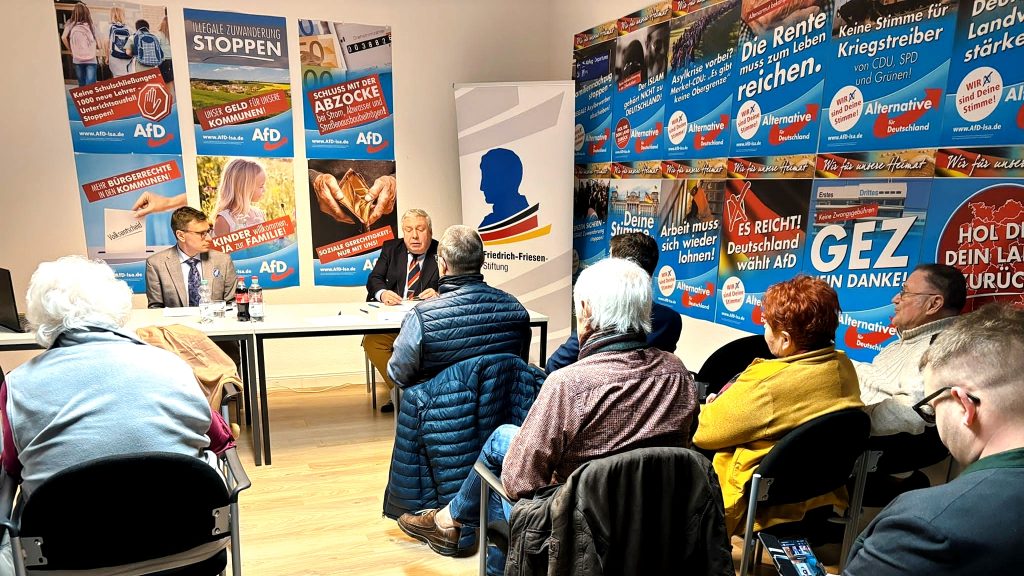On January 22, 2024, an event organized by the Friedrich Friesen Foundation took place in Magdeburg, which dealt with the topic of “Civil War or Great Power: A Forecast of the Future of Russia”, which is important for Germany. Economist Jurij Kofner from the MIWI Institute for Market Integration and Economic policy was invited as a speaker.
The event was hosted by Dr. Andreas Graudin, chairman of the Friedrich Friesen Foundation, moderated and was attended by special guests such as Oliver Kirchner, chairman of the AfD parliamentary group in the Saxony-Anhalt state parliament, and Dr. Jan Moldenhauer, spokesman for finance, budget and energy policy of the AfD parliamentary group in the Saxony-Anhalt state parliament, enriched.
At the heart of Kofner’s talk was the challenge of predicting Russia’s future, given the complexity and uncertainty of the geopolitical situation. The analysis was divided into four central areas: the foreign policy situation, the capital factor (resource base and finances), the workforce and demographic development, and the technology, value creation, economic and socio-political system factors. Kofner illustrated the various influencing factors using the production function Y = KLa.
With regard to the foreign policy situation, Kofner relied on Colonel Markus Reisner’s assessment that Russia would probably win the war in Ukraine. He also outlined an emerging multipolar world order in which the West will only make up a third of the global economy by 2050. Another interesting aspect was the idea that due to mass immigration, green deindustrialization and wokeness, right-wingers in the West could gain influence and seek normalization of relations with Russia.
In the capital area, Kofner highlighted Russia’s resource wealth, particularly in gas, oil, uranium, rare earths and food. He emphasized that Western embargoes and financial sanctions had little impact, and that despite the war, Russian state revenues from hydrocarbons were higher than in 2021. The decisive intervention of the Russian Central Bank was also cited as a decisive factor in Russia’s economic performance.
The technological dimension illuminated Russia’s transition to a resilient war economy. Kofner pointed to economic growth of almost 3 percent in 2023, but criticized the slow modernization of industrial production in recent decades. He emphasized that the import substitution policy had failed, but Russia was able to partially circumvent Western sanctions on the import of cutting-edge technologies. In addition, Russia can rely on a relatively sovereign digital economy with companies such as Yandex, Telegram and GLONASS, as well as a competitive nuclear and space industry.
Demographics was presented by Kofner as the biggest challenge for Russia, as the population has declined slightly since 2000. The decline in fertility rates despite successful prenatal policies, as well as the proportion of ethnic Russians in the state population from 80 to 72 percent, are worrying. The emigration of well-educated Russians since February 2022, half of whom returned disappointed from the West, exacerbated the shortage of skilled workers.
Kofner saw protests as unlikely in Russia’s political and economic system, as approval ratings for Putin and the government remain at the highest level. The possibility of a military coup after the failed March on Moscow was considered unlikely. To this end, Putin was able to put together a competent A-team in economic policy, which includes prominent names such as Gref, Naibullina and Mishustin. Still, he pointed to several critical challenges. At 71, Putin has not yet established a clear successor, and the issue of “succession to the throne” remains unregulated in Russia, much like it was in the Roman Empire. Another problem that Kofner addressed was the lack of transparency regarding the competition between the various rope teams, the so-called “Kremlin towers”. In contrast to the two-party system in the USA, these power struggles are not made public, which hinders political advancement and makes decision-making more opaque. Particular emphasis was placed on the difficulty of finding a political force in Russia that, on the one hand, supports Putin’s geopolitical strategies and conservative values, but at the same time advocates a stronger market economy.
Another significant problem that Kofner addressed was Russia’s so-called “state capitalism” and import substitution policies. Although these approaches provide stability, they are prone to stagnation. Kofner emphasized the need for an export-oriented economic policy and the promotion of small and medium-sized businesses as crucial elements for successful modernization. He emphasized that the orientation, whether with or without “Westernization,” is of secondary importance as long as national sovereignty is preserved as a state doctrine.
The speaker left the conclusion of the lecture to the audience, which of the factors mentioned is most likely to influence the future of Russia. Kofner ended his lecture with the well-known poem by Fyodor Tyutchev:
”You will not grasp her with your mind
or cover with a common label,
for Russia is one of a kind —
believe in her, if you are able…”

